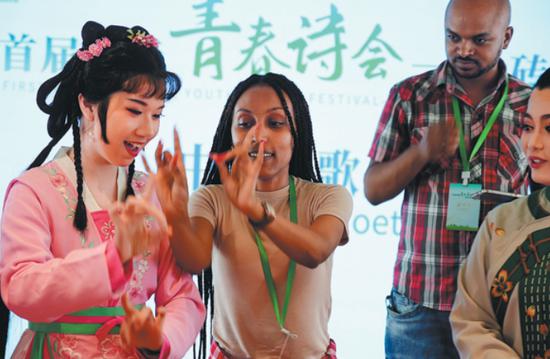Fuchun River sparks impromptu poetry on shared human emotions
From:China DailyAuthor: 2024-10-25 10:37

Poets from Ethiopia learn dance moves after watching a traditional Chinese opera performance aboard a cruise during the poetry festival in Hangzhou, Zhejiang province, on July 21. (Provided to China Daily)
For centuries, Chinese poets have captured the stunning beauty of the Fuchun River in Hangzhou, Zhejiang province, in simple yet poetic words. This July, poets from the BRICS countries stepped into the same river, drifting along the same route, and engaged in an impromptu poetry session inspired by the Fuchun River.
The poems, they created on the river during their six-day trip to China, and on a series of cultural activities they took part in have been recorded in the book Messengers from the Vernal Wood, which was released on Oct 18 at the Frankfurt Book Fair, Germany.
The book compiled by the Poetry Periodical also features poems written by 72 poets who took part in the First International Youth Poetry Festival: Special Session for BRICS Countries in July. It includes works from 49 poets from nine countries — Brazil, Russia, India, South Africa, Saudi Arabia, Egypt, the United Arab Emirates, Iran and Ethiopia, with each poem featured in both the poet's native language and Chinese. It also includes poems from 23 Chinese poets, with each poem in Chinese and its English translation.
Li Shaojun, editor of the book, said that poetry is a universal language of humanity, expressing shared human emotions. "The BRICS countries all have rich history, and through the universal language of poetry, we can greatly enhance communication and exchange, connecting more poets from the BRICS nations," said Li.
Speaking about his journey to the poetry festival held in China in July, Brazilian poet Thiago Moraes said he was still excited about his first trip to a country that is totally different from his own. "It took me two days to arrive in China. Very hard. But I was so happy to be in China to know new people, new cultures, new perspectives and new ways of living," said Moraes, who teaches Brazilian literature at a university in Rio de Janeiro.
In mid-July, aboard a cruise on the picturesque Fuchun River in Hangzhou, Moraes joined poets from China, Ethiopia and Iran for an impromptu poetry session. Each participant crafted a short, simple poem inspired by the beauty of the Fuchun River. This kind of poetry gathering was popular among ancient Chinese scholars.
The Brazilian poet was deeply impressed by the enthusiasm of the group and the crystal clear green waters of the Fuchun River. He learned about the ancient Chinese poets Bai Juyi and Su Shi, both of whom created many well-known verses. To his surprise, Moraes found some similarities with the Chinese counterparts: they all share a love of nature and a fondness for expressing their inner worlds through landscapes.
He said poetry makes people stay humble, open and diversified. "We poets should gather our efforts to make a better world instead of fighting all the time," he added.
Poet Shaikha Almteiri from the United Arab Emirates said she never imagined that one day she would set foot in China. She was excited about everything she encountered, including the people, the food, the museums, the ancient villages, the Great Wall and the Forbidden City.
She was often asked with questions like what are poets in the UAE writing about? What commonalities exist between UAE poetry and poetry from other countries?
"At the poetry festival in China, we find that no matter which country we come from, we are all creating with the same voice, the same heart and the same human spirit. We are all writing about the world of humanity, using the language of humanity. For example, we depict beautiful childhoods and the small flowers adorning braids," she said.
Almteiri enjoyed the poetry festival and said that such kind of gatherings and exchanges among poets might be the very catalysts for their innovation. She also expected for a future trip to China again.
For Ethiopian poet Seife Temam, the poetry trip to China made him fall in love with the country's ancient culture, especially the Tang Dynasty (618-907) poet Li Bai. This was also his first visit to China. Previously, he admired Chinese philosopher Laozi and considered him a great Chinese poet as well.
After visiting several museums, he became enamored with the clothing style and poetry of the Tang dynasty, which he found to be romantic, passionate and unrestrained.
While cruising on Fuchun River in July, he wrote a romantic verse: "I am a child of the Nile, yet I am captivated by the Fuchun River."
Li, the book editor, said that it was the first time for China to hold such kind of international poetry festival of BRICS countries. He hoped that through the book's publication, the influence of poetry events will grow among poets from BRICS countries, enabling more poets to communicate and exchange ideas with each other.
Edit:孫儷洋
The copyright of the article and the picture belongs to the original author. If there is any infringement, please contact to delete it